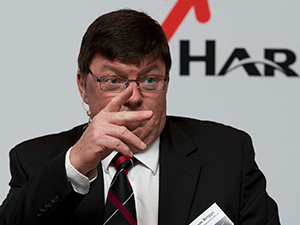
[miningmx.com] – Graham Briggs is to bring his seven year stint as CEO of Harmony Gold to an end after announcing his decision today to retire.
“The Harmony board will now commence a formal search for the new CEO,” the company said in an announcement, adding that Briggs would stay on in the post until a replacement had been appointed.
“The global mining industry is currently experiencing challenging times and we are committed to ensuring that Harmony continues to be a globally competitive company,” said Patrice Motsepe, chairman of Harmony whose company, African Rainbow Minerals owns about 14.6% in the gold firm.
The move comes at a time when his company stands the most vulnerable of all of South Africa’s gold companies should wage talks currently underway stall and unions resort to strike action.
The Chamber of Mines (CoM), which is representing Harmony as well as Sibanye Gold and AngloGold Ashanti among others, said it had made revisions to its opening offer but that it and the unions were “far apart”.
“Notwithstanding revised demands by the National Union of Mineworkers (NUM), UASA and Solidarity yesterday, and revisions to the chamber’s offer that were tabled today, the parties remain far apart,” it said in a statement.
Discussions with the Association of Mineworkers & Construction Union (AMCU) regarding a dispute about the findings of an audit into its membership numbers also continued.
“The Economic and Social Sustainability Agreement is critical to the long-term sustainability of the industry, and its ability to preserve jobs,’ said Elize Strydom, lead negotiator at the chamber.
She added that the chamber had revised its offer by increasing retrenchment payouts and increasing medical aid payouts. It would also consider increasing the retirement age to 63 years without saying if it could agree to it.
However, changing the basic salary and gain-share (profit share) offers was beyond the chamber “… without affecting the sustainability of the sector and threatening jobs,’ said Strydom.
On June 29, the CoM proposed a five-year wage deal to unions in which increases to basic pay for entry-level workers are set between 7.8% to 13% a year, and included a profit share element.
In return, the industry said it wanted agreement from unions that they will support efforts to lift the productivity of mines through “new forms of work organisation”.
This was in response to demands from unions which include a R12,500 per month in wages for entry level workers from the AMCU while the NUM has demanded increases of 80% for certain employee grades.










